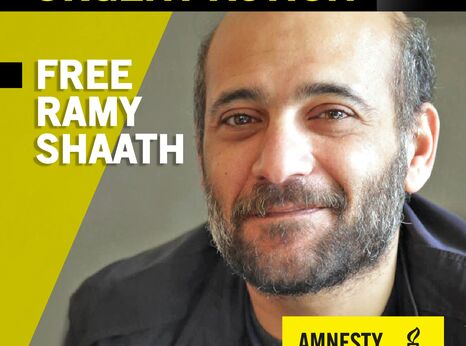Political activist arbitrarily detained

On 5 July 2019 at approximately 12:45 am, at least a dozen heavily armed police officers stormed the house of political activist Ramy Shaath in Cairo, without identifying themselves or presenting an arrest warrant. Police officers searched his house and seized computers, hard drives and mobile phones. They arrested both Ramy and his wife Céline Lebrun Shaath, a history teacher and community organizer, who was subsequently unlawfully deported to France on the same day, despite legally residing in Egypt since March 2012. Security forces transferred Ramy to an undisclosed location and concealed his whereabouts for about 36 hours. Police officers in the Qasr el-Nil police station, in Cairo, denied to Ramy’s family and lawyer that he was in their custody. The family was later informed by a lawyer that Ramy appeared before a prosecutor at the Supreme State Security Prosecution in New Cairo. Ramy was not allowed to call his family or legal counsel and was represented during the interrogation session by a lawyer who happened to be present in the court building at the time.
According to the family, the prosecutor informed Ramy that he is accused of “aiding a terrorist group in achieving its goals”. However, he only questioned Ramy about the nature of his political activities in Egypt and did not provide any evidence against him. The prosecutor based his accusation on a secret file gathered by the National Security Agency (NSA), despite a 2015 decision by one of Egypt’s top courts, the Court of Cassation, which ruled that NSA investigations do not constitute evidence on their own. Further, the prosecutor has not allowed Ramy or his lawyers to examine the NSA investigation file.
According to the authorities, the investigations in the case relate to a “plot by civil activists in cooperation with the Muslim Brotherhood to undermine the state”. The case includes people from across the political spectrum, who are not connected to one another. Amongst them are at least 15 politicians, students, journalists and labour rights activists who are arbitrarily detained over unfounded charges that relate to their legitimate political activities, human rights work, and the peaceful expression of their opinions. On 6 July 2019, the prosecutor ordered Ramy’s detention for 15 days pending investigations and has since been renewing it every 15 days in automatic renewal hearings. Under Egypt’s Code of Criminal procedures and the 2015 counter-terrorism law, prosecutors can issue pre-trial detention orders against individuals accused in “terrorism-related” cases for up to 150 days, without referring them to a judge.
Egypt has seen a rise in the number of detainees being held in pre-trial detention for months and sometimes years over terrorism-related charges, in many cases based on NSA investigations alone. Two months after the amendment of Law 8/2015 on Terrorist Entities and Terrorists in February 2020, a terrorism circuit in Cairo’s Criminal Court included Ramy and 12 other individuals in Egypt’s “terrorist" lists for five years. The recent amendments give the Public Prosecutor the power to submit to courts lists of entities and persons to be designated as “terrorists” regardless of whether an alleged “terrorist act” has actually occurred and based only on “police investigations or information”. Ramy was added to the list without any hearings or due process. Ramy’s inclusion on “terrorist” list for five years also leads to the imposition of travel bans and asset freezes, the seizure of his Egyptian passport and the prohibition of political activities as per article 7 of Law 8/2015. Ramy's lawyer appealed the court decision.
Ramy is a political activist, who has played an instrumental role in co-founding several secular political movements in Egypt, including the El-Dostour party, a political party founded by Mohammad ElBaradei in 2012. He is also the co-founder of the Boycott Divestment and Sanctions (BDS) movement in Egypt and has been its Egypt coordinator since 2015. The BDS movement campaigns to hold Israel accountable for human rights and other international law violations, using non-violent means. As part of his activism, Ramy raises public awareness about Palestinians’ rights and has been vocal in the media in denouncing the Israeli occupation of Palestinian territory. Prior to his arrest, he had participated in public events and gave media interviews in which he expressed his strong opposition to the US plan to end the Israeli-Palestinian conflict, known as the “deal of the century”, and against Egypt’s participation in the Manama meeting on 25-26 June 2019 aimed at discussing the plan. The Egyptian authorities have been harassing Ramy for years because of his political activism. In April 2012, the Ministry of Interior refused to renew his Egyptian passport in an attempt to deny him his Egyptian nationality. Although he won a case in 2013 before the Cairo Administrative Court, the Ministry of Interior appealed the verdict in 2018; the appeal is still pending.